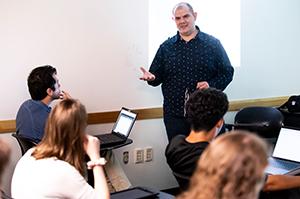From Tufts to the Stage

Growing up in Gilroy, California, PhD student Javier Luis Hurtado has many memories of visiting neighboring town San Juan Bautista at Christmastime to watch the theater group El Teatro Campesino (The Farmworkers Theatre) perform La Pastorela, a Mexican, Catholic, pageant play about the nativity. Pastorelas have a long tradition of performance in the U.S and Mexico. In his late teens and into his twenties, Hurtado would perform in La Pastorela and in other productions as a member of the El Teatro Campesino’s Core Ensemble. From there, he would go on to earn his M.F.A. in creative writing and write, direct, and perform in his own performance work across the country.
His experience with El Teatro Campesino, Hurtado says, first as an audience member and then as a member of the troupe, has deeply informed how he writes about, thinks about, and does theater. Now, as a third year PhD student in the Theatre and Performance Studies program, Hurtado’s research at Tufts brings his focus to the history of La Pastorela and the history of Latinx theatre and performance in the U.S.
A Focus on Performance
After completing his MFA in Creative Writing at University of California, Riverside in 2017, Hurtado knew he wanted to teach, but wanted to strengthen his background in theater history.
He says of his PhD program search, “I was looking for something that was going to offer a really rigorous training in theater history, but that was also going to be thinking beyond theater history and engaging with performance studies.”
He met Noe Montez, director of graduate studies for the Theatre and Performance Studies program, at a conference for Latinx theatre makers in New York, and was interested in working with him as someone who has also focused on Latinx theater as well as dramaturgy. He was also previously familiar with Kareem Khubchandani, Mellon Bridge Assistant Professor, from Khubchandani’s work as a drag performer and his scholarship in the areas of drag and nightlife studies. Hurtado has been performing in drag since 2008 when he was part of the queer performance trio NosJotros which birthed his drag alter-ego named Perra Pumps around whom he has built a sequence of three plays, one of which he has toured and performed as a solo show.
When Hurtado arrived on campus, he found Tufts’ program to be a great fit in many ways. “I realized that everyone on faculty has a really intense background in not only thinking about and writing about performance, but also in making performance” he says.
Playing Out History
History, queerness, and the preternatural are themes that feature prominently in Hurtado’s creative work, but they are his specific research focuses at Tufts. Hurtado is currently in the process of submitting a proposal for his dissertation that will concentrate on retellings of La Pastorela.
“The big question that I’m obsessed with at the moment for this project is about the ways that this play gets used as a teaching tool. What are the lessons that it’s trying to teach across time?”
Hurtado is looking at the way that the play traveled from Spain to Mexico during the Spanish conquest, where it was used first as a tool in the conversion of Native populations to Catholicism, then later was adopted into Mexican folk culture with a different message for audiences, and finally to its 21st century legacy in the LGBTQ+ community in California and Mexico.
“I’m trying to trace how this play gets to a place where it’s being performed by casts of predominantly queer Mexican men, drag queens, and go-go dancers and is just this big celebration of queerness and desire and fun. When that switch happens, what is this new iteration teaching its audiences? Because I still do think it is a teaching tool.” For this project, he is working with Teatro Alebrijes, an LGBT Latinx theater group based in San Jose, CA, who perform an adaptation of La Pastorela every year.
In addition to his dissertation research, Hurtado has presented research about race and the history of Mexican circuses in the United States at the 2018 Circus Historical Society’s annual conference. He is also currently working on a smaller project which examines the way family is used to pass down performance traditions, focusing specifically on families in traveling performance forms like the commedia dell’arte theater tradition and El Teatro Campesino’s early formation during the agricultural labor strikes in 1960s California.
Writing and Performance Projects
While research keeps him busy these days, as he had hoped, Hurtado has still been able to stay involved with performance during his time at Tufts. A reading of his play Housewarming directed by Lilian Mengesha, Fletcher Foundation Assistant Professor, took place this past year in the Balch Arena Theatre. And in his first year, Hurtado worked with Laurence Senelick, Fletcher Professor of Oratory, on an adaptation of Ibsen’s Ghosts written by Hurtado and titled El Niño.
Most recently, during a trip to California while Hurtado was simultaneously doing research in the archives of El Teatro Campesino, his play, Lechuza, was premiered by the group and directed by Hurtado. Lechuza is part of a series of short, ten-minute plays which Hurtado describes as “queer retellings of horror stories.” He’s currently working on compiling these plays into a manuscript for publication.
Although he’s not embarking on any new playwriting projects currently, Hurtado sees his research and performance work as very interconnected. “In my performance work, I was already always obsessed with research, interviewing, and with getting to know people, communities, and spaces. I think my academic research is just an extension and a different way to do that same kind of work.”
